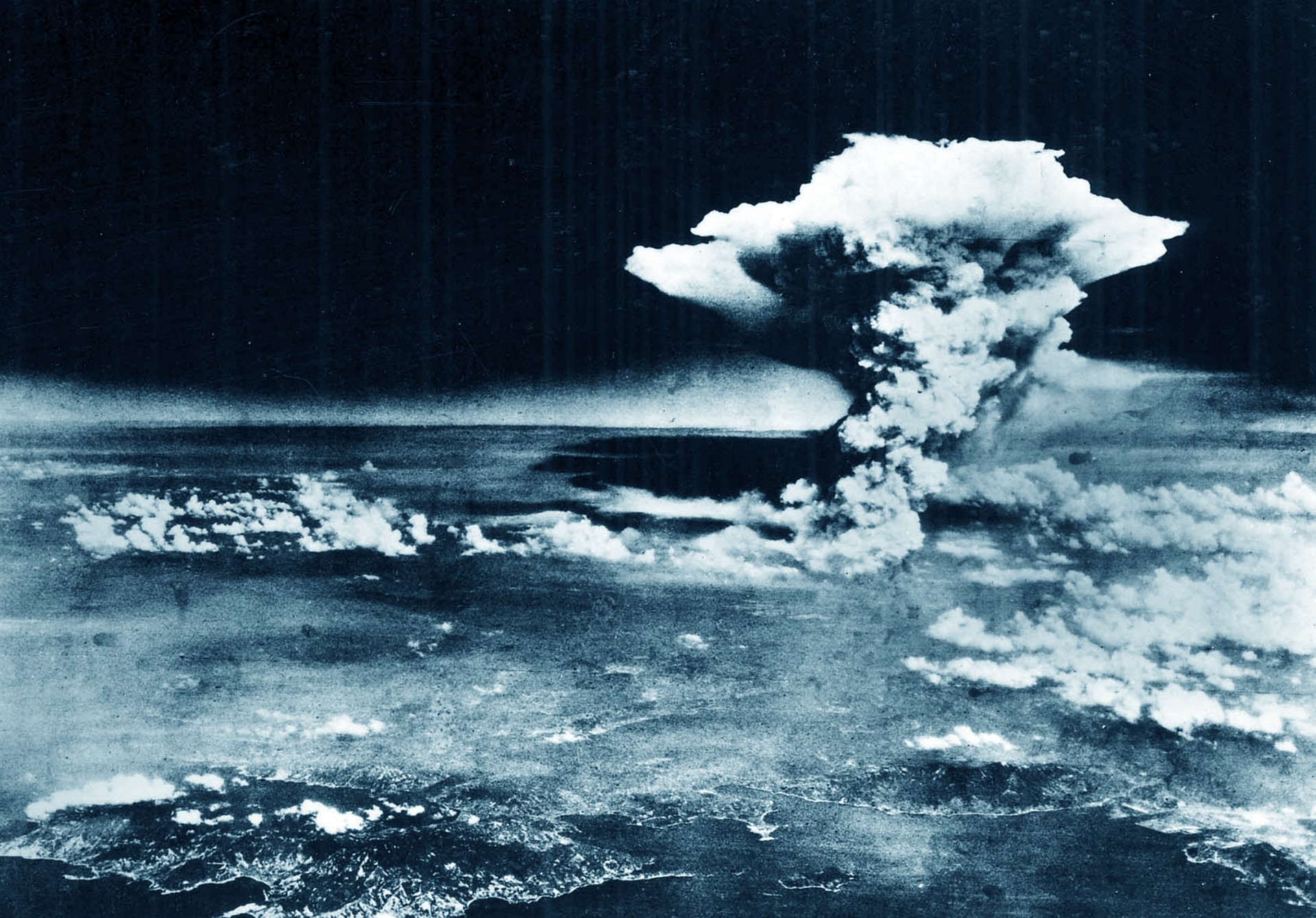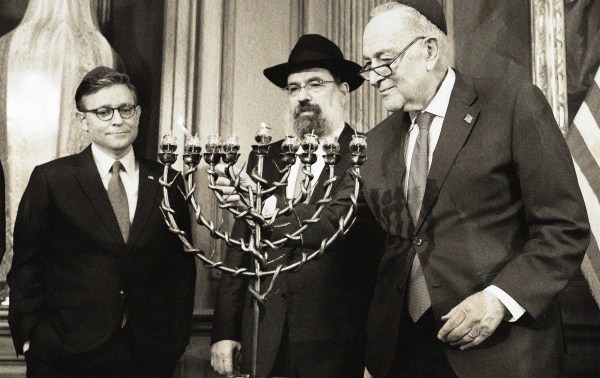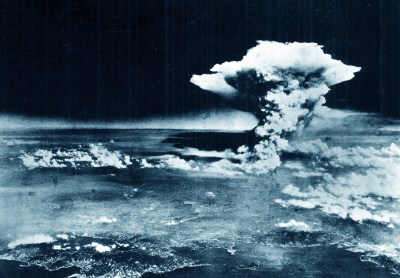In June 1956, the University of Oxford awarded American President Harry S. Truman a degree—an honorary doctorate of civil law, to be precise. Within the neoclassical grandeur of the Sheldonian Theater, dons and pupils joined to honor the president who had led the U.S. through the end of World War II: Truman’s British hosts, according to the New York Times, hailed him as the “truest of allies” and the “personification of simple courage” in near-unanimous agreement.
In the leadup to the celebration, however, there was one vocal dissenter.
Elizabeth Anscombe, at the time a fellow at Oxford’s Somerville College, protested to her fellow faculty members that the man responsible for the bombings of Hiroshima and Nagasaki—which about 80 years ago resulted in upward of 200,000 civilian casualties—did not deserve the recognition. (“A couple of massacres to a man’s credit,” in her view, should generally preclude him from institutional pats on the back.) Though reports vary, Anscombe’s efforts received little to no support. Truman got his degree.
Despite that midcentury defeat, Anscombe went on to become one of the most celebrated moral philosophers of her generation. She translated the key work of Austro-British philosopher Ludwig Wittingstein, her mentor, and pioneered an Aristotelian revival in ethics. She debated C.S. Lewis—reportedly compelling him to revise a chapter of his book on miracles—and supervised the conservative thinker Roger Scruton. Upon her passing in 2001, she was eulogized in National Review as “a titan in the world of philosophy” by Robert P. George, arguably the most decorated social conservative intellectual in America today. Ivy League traditionalists found in her thinking an alternative ethic to the sexual liberation of the 1960s, even naming a network of societies after her.
To many of her admirers, Anscombe is especially known for her writings on abortion and euthanasia, practices which she argued were often rationalized through a faulty notion of intent on one hand and a misplaced focus on their potential consequences on the other (she also coined the term “consequentialism”). Both tendencies, in her view, overlook that certain actions have an inherent moral status: Some things you simply cannot do, no matter the consequences. And for Anscombe, “choosing to kill the innocent as a means to an end is always murder.”
Except Anscombe wasn’t referring to abortion or euthanasia when she wrote those words (though they reflect her thinking on both). She was, as she would throughout her life, talking about war.
As Europe reeled from a deadly epidemic and the aftermath of World War I, Gertrude Elizabeth Margaret (G.E.M., or Elizabeth) Anscombe was born on March 18, 1919, in Limerick, Ireland. Her father, a British officer stationed in the Catholic country, returned his family to England soon after her birth. Though raised by “an atheist father and a nominally Anglican mother,” according to the University of Toronto’s John Berkman, Anscombe’s religious sights turned Romeward as a teen. Influenced by the likes of Marcel Proust, Bernard Shaw, and especially G.K. Chesterton, she converted to Catholicism, to her parents’ chagrin, at 19.
Anscombe’s conversion dovetailed with the impending Second World War. She pored over texts of the Christian just-war tradition under the mentorship of the recently reinstated Dominican Blackfriars at Oxford—they had been kicked out in the 16th century, when Henry VIII dissolved the monasteries—and, alongside her classmate Norman Daniel, authored a pamphlet explaining their moral concerns about the British war with Germany. “They are ‘evil things’ that we are fighting against,” she acknowledged in “The Justice of the Present War Examined,” published in 1940. Yet she remained worried. “Men can be moved to fight by being made to hate the deeds of their enemies; but a war is not made just by the fact that one’s enemies’ deeds are hateful.”
“The Justice of the Present War Examined” outlines seven conditions Anscombe believed were needed for a war to be just. The war must be motivated by a just cause (i.e., by a specific violation of rights), pursued by a legitimate authority, have reasonable hope of success, and be the only means to right a specific wrong. Britain, in Anscombe’s view, met these four criteria. In pursuing a war, however, the state involved must also be motivated by upright intentions, committed to solely using just means, and confident that the probable good of the war can outweigh its evil effects. On these three points, Anscombe was far more dubious.
Take the first of those three conditions: upright intentions in going to war. “The aim of the war must be to set right specific injustices,” she wrote. Yet Britain’s stated goals were vague and all-encompassing, stressing a need to sweep “away everything that Hitlerism stands for” and build “a new order in Europe.” “What does this mean” Anscombe reasoned, “but that our intentions are so unlimited that there is no point at which we or the Germans could say to our government: ‘Stop fighting; for your conditions are satisfied.’”
The archbishop of Birmingham eventually complained to Oxford that Anscombe’s pamphlet had taken “a line opposed to that of the Hierarchy of this country.” She withdrew it from circulation out of obedience to her church. Yet in the years since, the young Anscombe’s orthodox bona fides have been vindicated. “I think Anscombe is completely in step with the Catholic just-war tradition,” Joseph Capizzi, a professor of moral theology at the Catholic University of America, told me, emphasizing her continuity with thinkers from Thomas Aquinas to Francisco de Vitoria to Francisco Suárez. “Completely in step with it, without question.”
“In the genteel culture of Oxford moral philosophy,” writes Berkman, “Anscombe was the bull in the china shop.” No episode encapsulates the truth of that statement as well as Anscombe’s opposition to Truman’s Oxonian accolades.
By that time, Anscombe was in her late 30s and a professional academic generally unknown in the mainstream. Then came the Truman affair. What began as a murmured speech at a faculty council meeting responsible for selecting honorary degree recipients—the Oxford Mail described Anscombe as “a slight figure in cap and gown” who spoke “so quietly that she could hardly be heard”—soon made Anscombe an international sensation. Her protest was picked up by newspapers on both sides of the Atlantic, and a few weeks after her speech, Anscombe published a version of her remarks in pamphlet form, aptly titled “Mr. Truman’s Degree.”
The pamphlet expanded upon her earlier thinking, including the second condition she thought the British had failed to meet in entering World War II: committing themselves to solely using just means, especially by never intentionally harming innocent civilians. “The lives of the innocent,” wrote Anscombe, “are the actual point of society.” But who counts as innocent?
That was a crucial question. For one, the relationship between innocence and just cause is deeply intertwined. As Capizzi wrote in 2020 for Public Discourse, “choosing to kill your enemy’s innocents would lead to both parties having their own actual just cause for war,” since both sides would be able to raise legitimate claims of self-defense. Moreover, a prevalent theory at the time—Anscombe calls it “indivisibility”; we might consider it part of total war—blurred the lines between citizens and soldiers. It viewed economic and social strength as conduits for military strength, and as a result treated even noncombatants—who through commonplace activities like food production or mail delivery benefitted soldiers—as legitimate targets.
“I am not sure how children and the aged fitted into this story,” Anscombe wrote. “Probably they cheered the soldiers and munitions workers up.”
Sardonic flair notwithstanding, Anscombe proposed ways to distinguish combatants from civilians in order to determine innocence. Innocence in her view depends not on the views or allegiances of those under the enemy’s purview, but rather on specific actions and roles directly related to combat. A janitor or a grocer may loathe you and your country, yet insofar as he’s mopping floors or selling produce, he remains innocent. A soldier, by contrast, is a valid target in a just war even when he’s not actively attacking, for until he surrenders, his role is one of a combatant. (And even here, only within reason. Anscombe also wrote that “the enemy should not be attacked more ferociously than is necessary to put them hors de combat.”)
Anscombe fully understood that borderline cases might make the civilian-soldier distinction difficult to draw. Nonetheless, she insisted that it was not only possible but necessary to draw it—and that to make that call, a proper understanding of intention was needed.
Killing, in Anscombe’s view, is not ipso facto immoral. “If you attack a lot of military targets,” Anscombe writes, “such as munitions factories and naval dockyards, as carefully as you can, you will be certain to kill a number of innocent people. That is not murder.” But this careful conduct differs from “unscrupulousness in considering the possibilities” of actions in battle. Consider, as Anscombe did, the 1944 Battle of the Scheldt, in which the Allies decided to bomb sea dykes and inundate the Dutch island of Walcheren. They did, and 180 civilians died as a result.
Were those deaths intentional? It’s worth quoting Anscombe at length:
It may be impossible to take the thing (or people) you want to destroy as your target; it may be possible to attack it only by taking as the object of your attack what includes large numbers of innocent people. Then you cannot say very well that they died by accident. Here your action is murder.
In her time and in ours, apologists of high civilian casualties will often purport that the “intended” end was actually something more salutary: trapping German soldiers in Scheldt, for example, or ending the Second World War. But for Anscombe, intention is not reducible to a wished-for end independent of your chosen means. “You also intend all the things that you do as means to that objective,” John Schwenkler, a philosopher at the University of Illinois and the author of Anscombe’s Intention, told me. “If they’re the things that you do to bring the objective about, then you do those things intentionally.”
“If the atomic bomb had not been used,” wrote the American physicist Karl T. Crompton in 1946, “there would have been many more months of death and destruction on an enormous scale.” To Crompton, this was known with “practical certainty”; opposition to the bomb was “utterly fallacious.”
Anscombe was fully aware of this common argument, which hinges on the likely possibility of a prolonged, bloody conflict due to a potential land invasion of Japan. She also found it to be an utterly unpersuasive case for using the bomb. Why? Because appealing to consequences in ethical inquiry leads to grave errors.
These sorts of appeals are commonplace in our contemporary ethical imagination. Freshman year trolleyology asks us to consider whether we would pull a lever and sacrifice 1 (or 1o, or 100 …) to save 10 (or 100 …). But as Schwenkler and Mark Souva argue, this way of thinking is detached from real ethical experience, one in which context matters. And when appeals to consequences lead us to ignore context—What led me to this situation? What other options do I have?—we end up with false choices. Focusing solely on the likely death toll of an apparently inevitable land invasion, for example, ignores that Japan had explored prospects of a Soviet-mediated peace, which the U.S. rebuffed due to our policy of “unconditional surrender.” And it forgets that Truman decided to drop the bomb despite internal opposition, including from the chairman of the Joint Chiefs of Staff and from future President Dwight Eisenhower.
But more fundamentally, it ultimately doesn’t matter to Anscombe that potentially worse consequences may have been averted following each of these bombings. Consequences in ethical analysis are never as important as actions and intentions, and they can never justify doing something that is inherently wrong; to argue otherwise inevitably leads to an ethic in which moral absolutes wither away. (Humans will always be able to convince themselves that their circumstances are that dire.) If the intent behind Hiroshima and Nagasaki was to use civilians as means to that end, then no appeals to potential consequences could justify that decision. To do so, for Anscombe, was to rationalize murder.
It might be tempting to argue that Anscombe simply misunderstood the brutal realities of war and, unable to cope, settled for mere pacifism. But in fact, she explicitly rejected pacifism as a “false doctrine.” In a 1972 essay, she called pacifism “an illusion which would be fantastic if it were not so familiar.”
That essay, titled “War and Murder,” begins by stressing the necessity of coercive power, without which functioning societies would be “generally impossible.” Yet here’s the rub: Though coercive power is necessary, it’s also dangerous. It’s needed most of all to protect the innocent, yet it can also be abused and end up harming those it’s meant to protect—especially in war.
This tension for Anscombe—between the necessity for a coercive power and its susceptibility to abuse—gives rise to an ironic link between the pacifist and the war hawk, whom she ultimately regarded as two sides of the same coin. One opts out of war, the other pursues it ruthlessly, yet they both effectively give up on the possibility that humans can discern and abide by justice in war. “There really aren’t any moral principles between the kinds of killing we should be involved in” for either the pacifist or the war hawk, Capizzi told me. “The pacifists says, ‘We won’t do anything,’ and the other one says, ‘We’ll do whatever is necessary.’”
For Anscombe, pacifism’s unrealistic standard ultimately compels some people to reject any restrictions on killing in combat. It is “a trap” that leads to “the justification of monstrous things.” Faced with the inevitability of violence in war, pacifism fosters conditions in which many people will instead choose to do away with limiting principles. “Absolute pacifism is an ideal; unable to follow that, and committed to ‘compromise with evil’ one must go the whole hog and wage war à outrance.”
That was perhaps her most prescient insight.
In April 2024, former Fox News host Tucker Carlson paid a visit to manosphere mogul Joe Rogan. As expected, their conversation covered a lot of ground, from aliens and demons to AI and creationism.
They also talked about Hiroshima.
“It’s wrong to drop nuclear weapons on people,” Carlson said with his characteristically uncompromising tone. “And if you find yourself arguing that it’s a good thing to drop nuclear weapons on people, then you are evil.”
In recent years, the isolationist wing of the American right has reveled in relitigating the morality of World War II. Following the outcry over Carlson’s comments, fellow MAGA-verse pundit Candace Owens jumped to his defense. “[E]very American has a right to evaluate whether the drastic measure of dropping a nuke on a non-military target in a country that had been on the defense for two years (plus negotiating their surrender) was necessary,” she posted. Earlier this year, Tulsi Gabbard, the director of national intelligence, visited Hiroshima and upon her return posted an ominous video warning about impending “nuclear annihilation.”
It’s easy to dismiss this message given the bad-faith tendencies of its messengers. It’s hard not to, even. A few months after the Rogan interview, Carlson indulged a guest who had proposed that Churchill, not Hitler, was “the chief villain” of World War II. (He kept that habit up by inviting another guest with similar views late last month.) Owens has a long track record of conspiratorial—and antisemitic—thinking. Gabbard is infamous for her ties to former Syrian dictator Bashar al-Assad. If only conspiracists and autocrat apologists are questioning the validity of Hiroshima, why take them seriously?
But if the loudest opponents of America’s use of the bomb beget mistrust, its most vociferous defenders evince an uncompromising resolve that borders on dogmatism.
In a 2024 interview with NBC News, for example, Sen. Lindsey Graham was speaking about Israel’s war against Hamas. He then brought up World War II, saying:
Why is it ok for America to drop two nuclear bombs on Hiroshima and Nagasaki to end their existential threat war. Why was it ok for us to do that? I thought it was ok. To Israel: Do whatever you have to do to survive as a Jewish state. Whatever you have to do.
Commemorating the 80th anniversary of the Hiroshima bombing last month, National Review’s Rich Lowry proposed that while it’s “nice” to think Japan’s surrender could have occurred without the bomb, dropping it “was clearly the right call” and that “the atom bomb was the peacemaker.” And responding to a provocative post on X that read, “I’m ok with as many dead kids as it takes to stop Hamas,” the author Wilfred Reilly bit the bullet in agreement with reference to the bomb. “That is the unspoken rule in literally every war ever to happen,” he wrote. “You don’t try to kill them, but every single American would prefer (X) number of children burned alive in Dresden and Hiroshima to Hitler victorious.” (I shudder to think of the integer most proponents of his view would substitute for X.)
For defenders of America’s decision to drop the bomb, a set of established responses typically come up: Total war was needed to secure future peace. The bombings saved many more lives (American lives, importantly) that would have been lost in a ground invasion of Japan. Still others might further specify that the character of the Japanese regime was not culturally prone to surrender. Plus, we won the war.
But what’s rarely, if ever, reckoned with is how easily these commonplace reactions forfeit limiting principles and moral absolutes. What begins as a seemingly hard-headed realism about “the tragedy of war” turns into a blanket justification for destruction—and confuses destruction for something good. That was the case then and remains the case now. (Graham’s unequivocal “whatever you have to do” soon turns into callousness toward civilian life.)
Amid this sound and fury, between provocateurs who sully peace by blending it with conspiracies and war hawks who react to destruction and death with shrugs or even cheers, there’s a deep need on the right for a sensible voice in a senseless time.
Thankfully, we have Elizabeth Anscombe.
Deviant intentions. Unjust means. And, lastly, an imbalance between hoped-for good and evil tolerated.
That last one is the third condition that the 19-year-old Anscombe argued Britain had not satisfied in deciding to enter the Second World War. “After the war, what prospects have we,” she wrote, “but of greater poverty, greater difficulties, greater misery than ever, for a space until just another such war will break out.”
In very obvious ways, she was flatly wrong. Global poverty has plummeted since the war. As markets have globalized, so has material prosperity. Though Anscombe worried about a “repeated Versailles,” Germany (and later, Japan) were not humiliated but rather rebuilt through the assistance of the former Allies, led by the United States. The liberal international order resulted in a safer world than the one before it—and the prospect of its decay is one of the pressing issues of our time. The probable good effects of the war do in fact seem to have outweighed the evil ones.
Yet this view so often ignores something essential, something that the young Anscombe rightly anticipated: that World War II became the sort of war in which “not only are morals lowered, but the very theory of morals is corrupted.” It’s possible to be glad that the war was fought and to lament how it was fought. Yet few do. It’s necessary to admit that we arrived at a more just world and that we did so through profoundly unjust means. Yet these positions are controversial. That the liberal world order was attained through Hiroshima and Nagasaki too often prompts not sober reflection but rah-rah chest thumping.
“There is a widespread tendency to make what our country chooses to do, the criterion of what may be done, and to call this patriotism,” wrote the perspicacious young Anscombe. If the left has been historically guilty of forgetting the virtue of patriotism, the right—the side far more likely to report patriotic feelings—falls for this corollary vice.
My guess is that most fellow conservatives—who, like me, worry that many on the right are losing sight of America’s ability to be a force for good in the world—will hear Anscombe’s conclusions about Truman, Hiroshima, and our decision to drop the bomb and stridently disagree with her. But it should also be clear that she possesses a far more rigorous intellect and upstanding character, especially when stacked against today’s isolationists. And it should also be noted that her approach to justice and war stems from a way of thinking that many religious conservatives—especially Catholic conservatives—use in beginning- and end-of-life questions. They rely on a particular understanding of intention and are committed to particular moral absolutes. Why this framework is applied to an issue like euthanasia but not to war is an open question.
The basic contours of the Truman affair, of a college professor protesting an American president’s actions in war, could have so easily resulted in a forgettable instance of performative outrage from the ivory tower. But with Anscombe at its center, history got something else: a model of principled—and even consequential—dissent.







Please note that we at The Dispatch hold ourselves, our work, and our commenters to a higher standard than other places on the internet. We welcome comments that foster genuine debate or discussion—including comments critical of us or our work—but responses that include ad hominem attacks on fellow Dispatch members or are intended to stoke fear and anger may be moderated.
With your membership, you only have the ability to comment on The Morning Dispatch articles. Consider upgrading to join the conversation everywhere.